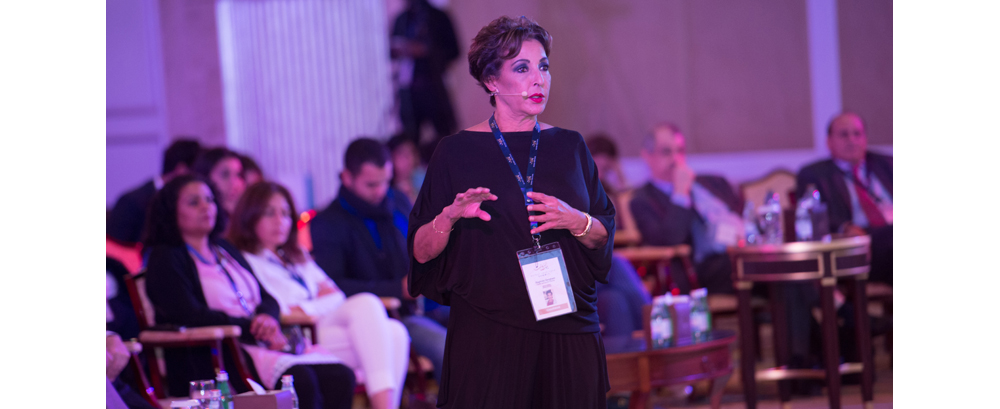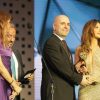Difficult to define Raghida Dergham in few words. Political analyst, correspondent, commentator, she is above all a journalist. A national and international journalist. She is animated by curiosity and courage with an exceptional persistence and self-confidence. The retreat of her candidacy from the parliamentary elections raised multiple questions. In a precious interview given to Prestige, Raghida, founder of Beirut Institute and awarded in London the prize of the Arab woman 2017, reveals to Prestige her projects and feelings.

Journalist, political analyst, correspondent, commentator, are the qualities that define your rich path. Who is Raghida Dergham? What in your opinion are the qualities required to make a good journalist? Raghida Dergham is curious. This is the first tenant of being a journalist- be it a reporter, commentator, or columnist. Curious and courageous, because without courage, no journalist can gain admiration for pushing the envelope. Persistence is the only way for a journalist to get the story, but gaining confidence requires consistency and credibility.
That’s why Raghida Dergham has been able to carve her place as a fearless global journalist, columnist, and commentator.
Curiosity. Doing the homework. Listening attentively in order to do the follow-up. The art of the pointed question, that reflects command of the subject. Last but not least, the skill of writing is detrimental to the success of a journalist.
You were established in the US and you presented your candidacy to the Lebanese parliamentary elections. Why? What was your electoral program? I have spent over 40 years in the United States, and I enjoyed a very rich career as Al Hayat’s Bureau Chief at the United Nations in New York. I had used the United Nations as a springboard to cover international affairs, which took me to eventful summits and conferences all over the world. The network of my global contacts, as well as my associations with global think tanks, inspired to think of establishing Beirut Institute – a think tank for the Arab region with a global reach.
This was eight years ago and it marked the beginning of my intense thinking of impacting Lebanon’s politics. When it was decided that there will be elections, after repeated renewals of the parliament. I realized that my vast experience and knowledge in geopolitics, as well as my passionate focus on the right of citizens to basic wellbeing would equip me to serve well in the parliament. I am rich with people’s love and admiration, and they flocked to support me once they heard I might be interested in a parliamentary seat. That is why I decided to dive in.
I had made the decision to contend in the elections for reformative goals, not for political ambitions, or to be on vindictive lists operating out of political and personal grudges. I regret the muddled state of political activists who call themselves civil society, because some of them have entered the electoral process as a project to attain power and personal gain.
These are the reasons I have withdrawn from two lists and withdrawn my candidacy for parliament. I withdraw feeling regret and pain for this country. I have returned from overseas after 40 years hoping to invest my career as an international journalist who enjoys trust and credibility in public work. I am withdrawing temporarily but I leave open the prospect of other opportunities in public service.
In your opinion, what is the relation between politics, being a member of the parliament and journalism? I am what is referred to as the Diaspora Lebanese- having spent over 40 years in the United States. It’s not only nostalgia that brought me back home, it’s in fact my determination to contribute to the evolution of Lebanon by applying my experience in policy and media to the public sphere.
As Founder and Executive Chairman of Beirut Institute, I value the notion of convening minds, collective thinking, and attracting the return of confidence and investment in the infrastructure in order to provide basic services and rights to citizens.
As a Geo-political columnist and a strategic thinker, I have the benefit of a wider reflection on the impact of global policies on local matters which would have certainly guided my performance in the parliament.
Being a natural communicator fine-tunes my attention to the public’s needs which will always be my top priority.
From Beirut to Beirut, this is my journey. Whether legislating laws that are fair and uphold accountability, or expanding the definition of national security, this will always be my task and my challenge. Securing that women and youth are in government is a first step towards the goals I aspire to accomplish.
You also are the founder and Executive Chairman of Beirut Institute. Tell us about it…Beirut Institute is my passion and my project. Beirut Institute has now become an international brand as an independent non-partisan think tank for the Arab region with activities and events in multiple locations globally. This is a cutting-edge, forward-looking, solution-driven institute adamant at achieving sustainable impact on local and global policy. Beirut Institute is proud to serve as a catalyst for intergenerational, innovative, and solution-oriented thinking putting forward thoughtful policy options.
Designed as an Arab Brain Trust and a collective of expertise, Beirut Institute provides a dynamic platform for enlightened thinkers to shape the debate and develop influential policy options and strategies.
I started developing Beirut Institute in 2010 because I was pained by the sense of resignation amongst even the brightest in the Arab region, young and old. Disillusionment with the present produced either nonchalance or complaint. Eight years later the need to step up and take the lead in shaping the future of the Arab region and its place in the world is more urgent than ever. Time has come to repeal past patterns of submission and resignation and replace them with ambition and enthusiasm to engage within ourselves and with the wider world.
Beirut Institute does not dwell on failures or handicaps. Our task is to think of innovative solutions to current challenges and to devise strategies for future opportunities. We will not simply settle in predictions; we instead take on the challenge of thinking thoroughly through options and means.
Collective brilliance and passion, coupled with persistence and resilience, can enhance the discourse towards moderation locally and place the diverse landscape in the Arab region on the map as effective and influential players globally. Beirut Institute achieves this through strategic partnerships with like-minded institutions globally and has become a pivotal destination for those interested in transforming the Arab region and Arab relations with East and West.
In October 2015, the city of Abu Dhabi welcomed Beirut Institute to host its first summit entitled: Reconfiguring the Arab Region and its Global Space Beyond Political Economy and Security Threats. The summit took place in the presence of 250 global leaders, dignitaries and senior public policy experts from the UAE, the Arab region, USA, Europe, Russia, China, South America and Africa.
We promised to deliver a forward-thinking and dynamic summit that would address and find solutions to problems related to the security and stability of the region, and we did just that. We opened the dialogue of change, presented recommendations and viable solutions to decision makers, and encouraged cooperation and unity. The key message was that retaining the status quo is simply not going to work anymore.
We had insightful conversations about the need for the GCC and UN to take a three-pronged approach to reconfiguring the region. We discussed the importance of educating our youth and equipping them with the skills needed to embrace an ever-changing and challenging future. And we considered how to move forward responsibly in light of changes to the regional balance of power due to the conflict in Iraq, Syria and Yemen. We highlighted the role of policy in achieving a positive reconfiguration of the Arab region. Panelists addressed the importance of Arab coalitions, and called for a central regional institution that could work on the stabilization and resolution of conflicts. We heard individual perspectives on the potential of Smart Cities, and how best to promote a truly digital Arab region.
Experts had differing opinions on how to bring about peace and security to help realize the economic potential of the region – should we use military force or political efforts – and there was a call for increased legitimacy, good governance and regional cooperation across the GCC.
We discussed popular culture, and how film can counter negative regional influences such as ISIS. There were also some thought-provoking perspectives on how to effect change in the region, from empowering citizens to encouraging entrepreneurial spirit, and an enlightening session with creative and talented young business leaders.
This year, and on May 12 & 13, 2018 – we are holding Beirut Institute Summit Edition II in Abu Dhabi. This year’s theme is: Constructing the Arab Region’s Engagement in the Emerging Global Future. Once again, Heads of State, Ministers, Policy Circle members, CEOs from the private sector, and media leaders will address Beirut Institute Summit in the open plenary which will follow the closed sessions of the Policy Circle.
In 2017, you were awarded in London a prize given to Arab successful women. In which category? Here’s some info from the news release that could answer your question.
Raghida Dergham is named «Arab Woman of the Year» in London for her achievements in Journalism.
Taking place in Britain’s capital London, the third annual Arab Women of the Year Awards celebrated the achievements of Arab Women and honored the most notable Arab women who have made an impact nationally and internationally in various fields including education, culture, entrepreneurship, journalism, science, community service, and literature.
Raghida Dergham is a Lebanese-American media veteran who has excelled as an international journalist and a strategic political columnist. She has conducted exclusive interviews with over 20 Heads of State and Government and over 100 Foreign Ministers. She is a commentator and political analyst for several Arab and international television networks.
Upon receiving the award, Raghida Dergham said, “It is an honor and a privilege to receive this special recognition, and I thank all those who made it happen, in particular former First Lady of Lebanon Mrs. Mona Hraoui for nominating me. This award is for every journalist who has upheld the fundamentals and ethics of the profession, and for every woman in the Arab region who dared to break the glass ceiling. And to every girl who dreams of standing in my place tonight, I say: dream and persevere and do not fear. However, on this very night, I dedicate this award to my daughter, Thalia, especially as she is the New Yorker who made London her city and her home.”
During your professional career, you encountered numerous Lebanese and foreign personalities. Which memory truly marked you from these encounters that you would like to evoke? Of course, it always is the memory of the non-aligned summit in Belgrade in 1989 on my first assignment as Al Hayat’s Senior Political Correspondent. This was the scoop every journalist dreams of – interviewing ten heads of states and eight foreign ministers in the span of eight days. Surely, I slept merely two hours a night, but the exhilaration at such historic opportunity for any journalist erased all the exhaustion.
1989 is a very special year for me – the year of conceiving my daughter. No matter how many scoops and what heights I have reached professionally, my greatest accomplishment is my daughter Thalia. She remains the true source of pride and happiness, and I remain forever blessed and grateful to be her mother.
If you were elected member of Lebanese parliament, what would you have done to improve women’s condition? It’s time that women get their rightful place as policy makers and that girls are protected by laws legislated in the parliament. While this was my prime reason for running for elections, it remains my agenda after I dropped out. I will not disappear from the political scene. There is way too much to do on the issue of women and girls. But that is not my only drive. I will be in public service, one way or another, to shape the debate and to prove that women are fully capable and entitled to be serious policy makers.








